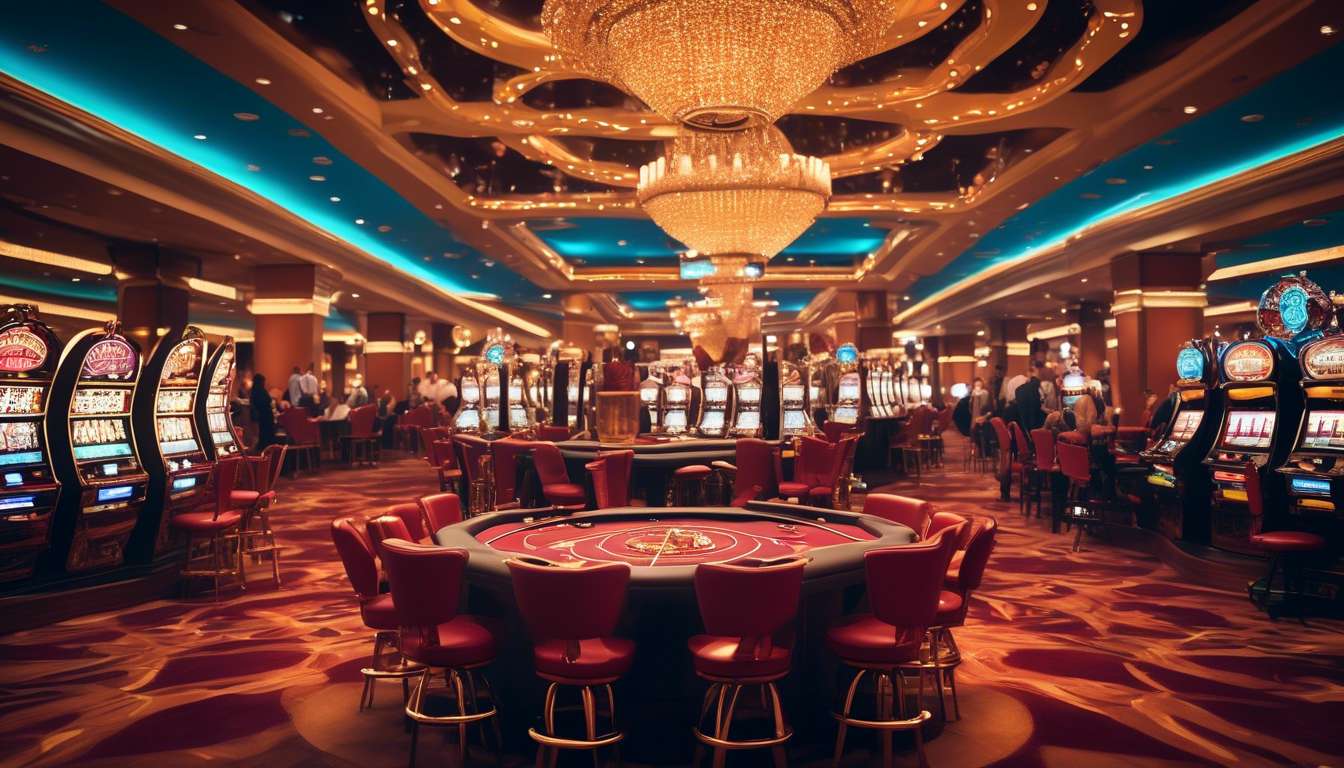When we step into the glitzy world of casinos, we’re met with a whirlwind of sights and sounds that promise excitement and fortune. Yet, behind the dazzling lights and the rhythmic clinking of slot machines lies a fascinating industry steeped in history and intrigue.
As avid enthusiasts and curious newcomers alike, we often find ourselves captivated by the allure of the casino. But how much do we truly know about these establishments beyond the surface glamour? In this exploration, we aim to uncover some intriguing truths that may surprise even the most seasoned players among us.
From the origins of these iconic gaming houses to the psychological nuances at play, we delve into four compelling facts about casinos that will enrich our understanding and perhaps even change the way we view our next visit.
Join us as we navigate the multifaceted world of casinos, where chance, strategy, and entertainment converge in uniquely captivating ways.
-
Historical Origins:
- Casinos have a rich history dating back to ancient times, with evidence suggesting gambling activities in China as early as 2300 BC.
- The term "casino" originates from the Italian word "casa," meaning house, and initially referred to small social clubs for gambling and other leisure activities.
-
Psychological Nuances:
- Casinos are designed to keep players engaged and spending money.
- Common tactics include the strategic layout of gaming floors, the absence of clocks and windows, and the use of ambient sounds and lighting to create an immersive experience.
-
Economic Impact:
- Casinos contribute significantly to local and national economies through job creation, tourism, and tax revenues.
- However, there is an ongoing debate about the social costs of gambling and its impact on communities.
-
Strategic Games:
- While many casino games are based on chance, others, like poker and blackjack, involve a significant level of skill and strategy.
- Understanding the odds and developing strategies can enhance a player’s chances of winning, adding an intellectual challenge to the excitement.
With these insights, we gain a deeper appreciation of casinos not just as places of entertainment, but as complex entities with historical, economic, and psychological dimensions.
Historical Origins
Casinos have a rich history that dates back to ancient civilizations, where people gathered to gamble and socialize. We find ourselves drawn to the idea of communal entertainment, where gambling becomes more than a game of chance; it’s an experience that brings us together. From the bustling streets of ancient Rome to the vibrant markets of China, gambling has always played a crucial role in our shared past.
As we trace back the historical origins of casinos, we see how gambling was a popular form of entertainment. It offered:
- A sense of excitement
- A chance to connect with others
- A shared pursuit of fortune
Gambling wasn’t just about winning; it was about the thrill and camaraderie of the moment.
Moreover, casinos have long contributed to the economy. They provided:
- Jobs
- Stimulated trade
- Created bustling hubs of activity
Our collective history with casinos shows how they’ve shaped not only entertainment but also the economic landscape across the ages.
Early Gambling Evidence
In our exploration of early gambling evidence, we find intriguing artifacts that reveal how ancient cultures engaged in games of chance. Dice discovered in Mesopotamia dating back to 3000 BC show that gambling was not just a pastime but a form of entertainment that brought communities together. These games weren’t merely about fun; they played a significant role in the social and economic fabric of ancient societies.
As we delve deeper, we uncover that gambling in China around 2300 BC was linked to their economy, with the use of tiles believed to be an early form of lottery. This highlights how intertwined gambling and economic activities were even then.
Additionally, we see that ancient Romans enjoyed betting on:
- Chariot races
- Gladiator games
This showcases a shared human desire for entertainment and the thrill of chance.
Through these artifacts, we connect with our ancestors, understanding that the pursuit of entertainment and the impact on the economy through gambling is a timeless human endeavor.
Origin of “Casino”
The term "casino" originates from the Italian word "casa," meaning house, which initially referred to small country villas or social clubs for pleasure and recreation. Over time, these spaces evolved into hubs of entertainment and social interaction, where communities gathered, shared experiences, and forged connections.
As we delve into the history, we see that gambling was naturally integrated into these venues, offering not just games of chance but also a sense of community and shared excitement.
Casinos have played a significant role in boosting local economies by attracting visitors seeking entertainment and leisure. These establishments have become essential to not only the gambling industry but also the broader entertainment landscape. They:
- Provide jobs
- Stimulate tourism
- Contribute to the economic fabric of their locations
When we step into a casino today, we’re not just participating in games; we’re partaking in a rich tradition that has evolved over centuries, inviting us to be a part of something larger than ourselves.
Design for Engagement
A well-designed casino captivates our attention by seamlessly blending visual appeal with strategic layout, ensuring every visitor feels drawn into the experience. As soon as we step through the doors, we’re greeted with vibrant lights and enticing sounds, creating a world where entertainment and gambling merge effortlessly. The design is key to making us feel like part of a thrilling community, where every spin of the wheel or flip of a card brings us closer together in shared excitement.
Casinos use their design to stimulate our senses, encouraging us to explore and engage with the various gaming options available. This engagement is not just about fun—it’s also a critical component of the economy. By keeping us entertained and invested in the moment, casinos boost local economic activity through:
- Creating jobs
- Attracting tourism
The layout ensures we can easily navigate from one area to another, maximizing our enjoyment and increasing the time we spend immersed in this dynamic environment.
Immersive Casino Environment
In an immersive casino environment, we find ourselves transported to a realm where every detail is meticulously crafted to enhance our gaming experience. As we enter, the ambient lighting, vibrant sounds, and plush interiors envelop us in a sense of belonging.
Here, it’s not just about gambling; it’s about being part of a world where entertainment is the key driver. We engage with others who share our excitement, creating connections that extend beyond the gaming tables.
The layout and design are purposefully structured to guide us through a journey filled with anticipation and thrill. We feel part of a community, one that thrives on shared experiences and collective exhilaration. The atmosphere is charged with energy, making us forget the outside world and focus entirely on the moment.
Furthermore, this environment plays a crucial role in the economy, as it draws us in not only for the games but also for the camaraderie and entertainment it promises.
This enriches our experiences while supporting local businesses.
Economic Contributions
Casinos significantly boost the local economy by generating jobs and attracting tourists who spend money in surrounding businesses.
Gambling is not just about placing bets; it’s a dynamic form of entertainment that draws people in, creating a vibrant community atmosphere. As we walk through a casino, the energy is palpable. People gather to experience not only the thrill of gambling but also the diverse forms of entertainment offered, such as:
- Live shows
- Fine dining
The influx of visitors means more revenue for local retailers, restaurants, and hotels, which in turn strengthens the economy.
We’re not just talking about small contributions; casinos can funnel significant financial resources into community development projects and public services.
By supporting local infrastructure, casinos help build a sense of belonging and prosperity in the community.
Let’s remember, the casinos’ economic contributions go beyond just monetary gains—they foster a thriving environment where everyone benefits.
Job Creation and Tourism
Casinos as Economic Catalysts
Casinos create countless job opportunities and boost tourism, fostering economic growth and community development. As we dive into the world of gambling and entertainment, we find that casinos provide a vibrant source of employment for our communities.
Employment Opportunities
A wide range of positions are available in casinos, contributing to a stronger local economy:
- Dealers
- Hospitality staff
- Security personnel
- Management roles
Tourism and Local Business Stimulus
By attracting tourists eager to experience the thrill of gambling, casinos stimulate nearby businesses such as:
- Hotels
- Restaurants
- Retail shops
This creates a ripple effect of prosperity.
Cultural and Community Impact
Casinos transform regions into bustling hubs of entertainment and activity. The influx of visitors not only enhances our local economy but also enriches our cultural landscape by promoting diverse entertainment options and events.
Community Benefits
This environment of excitement and opportunity can strengthen community bonds, as we come together to share in the benefits of economic growth. By embracing the potential of casinos, we can ensure a thriving, connected community.
Social Costs Debate
While casinos offer economic benefits, we must also consider the potential social costs they can impose on our communities.
Gambling, though a source of entertainment for many, can lead to addiction, affecting not just individuals but also their families and friends. We’ve all seen how a thriving economy can mask underlying issues, and it’s crucial we acknowledge the struggles some face when entertainment turns into compulsion.
As we enjoy the vibrant atmosphere casinos bring, we shouldn’t ignore the darker side that can emerge. The economic gains from casinos might contribute to local development, but they could also increase social services costs, impacting us collectively.
We must balance our desire for economic growth with the well-being of our community members. By fostering open dialogue and supporting responsible gambling initiatives, we can create a space where everyone feels they belong.
Together, we can ensure that the excitement of gaming doesn’t overshadow the importance of caring for each other’s welfare.
Conclusion
In conclusion, you’ve learned about the historical origins and design of casinos, their economic contributions through job creation and tourism, as well as the ongoing debate about their social costs.
Next time you step into a casino, remember:
- The rich history and impact it has on society.
- Enjoy the immersive environment.
Always gamble responsibly.




